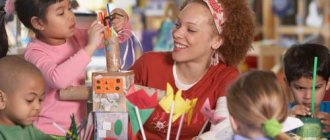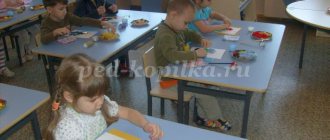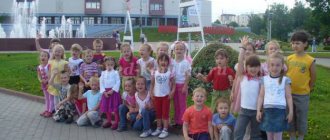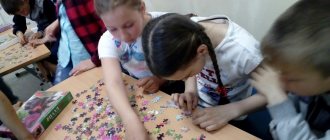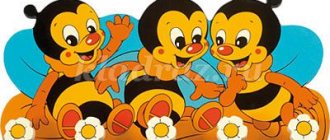Interaction between kindergarten, family and library in child development article (preparatory group)
Interaction between kindergarten, family and library in child development
Today in society, reading ceases to be an absolute value; its loss becomes a huge problem.
The reading experience of many generations testifies that interest in books arises precisely in preschool childhood, because the feelings of a preschooler are particularly emotional. And the earlier an interest in reading appears, the more significant and deeper a reader, a creative personality, a person with a high intellectual level is formed.
In recent years, our country has experienced a crisis in children's reading.
If ten years ago a preschooler always read a book with his parents at night, now books have been replaced by computer games, television and other “benefits” of the 21st century. Parents are increasingly wondering why their children do not read, forgetting first of all that love for a book begins with an example. It is necessary to instill a love for the printed word at a very early age.
By introducing a child to reading, we not only open the way for him to one of the most important sources of information, a book fills a person’s inner world, nourishes his mind and heart, encourages self-awareness, promotes self-realization, and fosters resilience, no matter what situations he finds himself in.
How to preserve the love of reading and pass it on to the younger generation?
The answer is simple! It is necessary to instill a love for books from early childhood, to light this fire in the soul of a child, which will lead him into the vast world of fiction.
Reading with family creates a special atmosphere of mutual understanding, and love and interest in the book is passed on from elders to younger ones. The ability to listen, sympathize, and empathize is formed precisely in moments of collective perception of what has been read, when older family members express their attitude to the events, characters, and language of the work.
Unfortunately, I had to admit that books and family reading do not occupy the first place in children’s lives.
To effectively solve the problem of introducing preschoolers to reading (perceiving) books, in 2015 an agreement was concluded on the interaction of the Children's Educational Institution "Child Development Center - Kindergarten No. 70" with the children's city library located on Kommunisticheskaya Street, 46.
The goal of this interaction is for children to master the basic cultural and moral values of society through joint activities with teachers, parents and children's library workers.
In accordance with the goal, the following tasks were set:
• development in children of cognitive interest in objects and phenomena of the surrounding reality, the formation of a holistic picture of the world;
• developing interest and need for reading (perception) of books;
• development of literary speech, artistic perception and aesthetic taste, broadening the horizons of children;
• formation of value guidelines in children by getting to know the culture and traditions of their native country, preschoolers’ awareness of family and citizenship, and nurturing patriotic feelings;
• increasing the pedagogical competence of parents.
The pupils of our group became acquainted with the library in middle preschool age, when library representatives came to us with interesting, educational presentations and brought books with them, but they began to work closely with the library in 2022, when they moved to senior preschool age
Caring, knowledgeable library workers Irina Alekseevna, Yulia Sergeevna and Elizaveta Mikhailovna interested the children so much that we began to meet with them every month.
In September 2022, we organized excursions to the city children's
library, where children got acquainted with the subscription and reading room, with new products in the world of books, with the professional actions of employees and the rules of conduct in the library. In the reading room, children not only got acquainted with books and their characters, but also read their favorite poems, watched cartoons based on familiar works, and actively participated in quizzes: “For the 300th anniversary of the city of Polevsky”, “Our writer P.P. Bazhov”.
Familiarity with the structure and operation of the library made the children want to create a real library in a group. Many parents supported our initiative and replenished our library in the group with interesting and exciting books that they brought from home. This is how the group library was born. Children began to turn to books more often, look at illustrations, become interested in the plots of works and discuss them. The plot-based role-playing game “Library” arose. The objectives are: to introduce children to library terminology and the rules of behavior in the library; develop an understanding of the significance of books in life; develop independence, communication skills and creativity; ability to analyze and compare; cultivate interest and respect for the book.
Children initiate the game, agree on roles, change them, and constantly develop and enrich the plot. Everyone wants to take on the role of a librarian and give out books to “readers.” It’s hard to say whether this is a game, because everything in it is real: real books, real children - readers, and even real library forms.
Of course, in the process of getting acquainted with books, reading them and looking at them, books break down: pages tear and jump out, covers become damaged. In this case, our group has a “Knizhkina Hospital” that repairs books. Children repair and restore “sick” books in a timely manner, with great desire and care. We note that our students have become much more careful with books, especially those that have been in the “hospital.” We keep a reading diary, where children draw pictures based on the works they read. Children and their parents can take books from our library home to read for a certain time, which is specified in the library form.
Our group participated in the competition “Best Corner of Fiction” and took 1st place among all groups of our preschool educational institution. We received the book “The Great Encyclopedia of Knowledge” as a gift.
Also in the kindergarten there is a mobile library, when library staff once a month bring books to the kindergarten for us to read, and we, in turn, return to the library those that we have already read and reviewed.
In October, our kindergarten held a recitation competition “Poems about Mom”: Yesenia took 3rd place, and Vanya S. took 2nd place.
In November, during the week of the preschool educational institution “Creativity of Children’s Writers,” an exhibition of A. Barto’s books was organized in groups by teachers and parents. The group’s students, together with library staff, created a cartoon based on A. Barto’s poem “The Juggler.”
In December 2022 Pupils of grade 5 “B” from Polytechnic Lyceum No. 21 “Erudite” came to our preschool institution to show us a fairy tale and give us books. We, in turn, made our own bookmarks and gave them to the students.
Three students from our group participated in an intellectual game among preschool institutions in our city and took 2nd team place. For winning we received an encyclopedia about our planet Earth.
For preschoolers, dramatization is extremely interesting - acting out the text in faces. Transformation into an artistic image makes it possible to show how the child understands the text, evaluates the characters, and imagines events. Staging becomes the most important technique in working with a literary text.
Our children actively participate in theatrical activities, love to turn into actors, and actively discuss the scenery and costumes. All conditions have been created for this in the group. For Mother's Day, the guys showed a re-enactment of the fairy tale “How a kitten was looking for its mother” for mothers and grandmothers.
Parents note that their children’s interest in books has increased significantly, which is very important when preparing for school.
Parents are our partners and participants in the educational process. To educate them, in informational parent corners we post consultations and reminders on the topics “What to read to a child?”, “Reading a fairy tale,” “Pure twisters and tongue twisters in the life of a preschooler,” and others.
Parents and children are regular participants in various competitions: Dasha T.’s family participated in the photo competition “My portrait with my favorite book” and took 1st place. The family of Timofey B. participated in the all-Russian quiz dedicated to the work of K.I. Chukovsky. Olya L.'s family took part in an international quiz dedicated to the work of A.L. Barto.
In October, pupils, together with their parents, participated in an exhibition of drawings based on the works of V.G. Suteev, which was located in our preschool educational institution.
In September and December 2022, our students, together with their parents, actively participated in the “Save the Tree” waste paper collection campaign, organized by the staff of our preschool educational institution. Children, parents of other groups and kindergarten staff joined this action. We saved a lot of trees and took 3rd place among all groups, our library was replenished with a new encyclopedia about Dinosaurs for the place we took. Children began to take care of their native nature. After drawing or appliqué, the paper is no longer thrown into the trash, but is put into specially prepared boxes to save more trees.
To summarize, we can talk about the effectiveness of the work done:
— children’s interest in reading and books has increased, children are actively involved in reading activities. Board games “Syllables and Words”, “Fun Alphabet”, “Letters” and others are in great demand among children. Of the 25 children in the group, 7 read fluently, 9 read syllables well and reflect what they read in their drawings;
I would also like to note that children’s speech has become more expressive, clear, and emotional. The practice of “family reading” has strengthened, the authority of the city library has increased, and parents with children have become more active in using its services.
There is every reason to believe that the love of books and reading will remain in children throughout their lives.
By introducing children and adults to reading, we not only open the way for them to one of the most important sources of information, the book fills a person’s inner world, nourishes their mind and heart, encourages self-awareness, promotes self-realization, and fosters resilience.
Pisarenko M.N. leading specialist of the children's reading room of the West Kazakhstan OBDYu named after. Kh. Yesenzhanova
Working with preschoolers is a very interesting and serious matter. After all, it is at this tender age that interest in books awakens. But in the area of access to library services, the child is entirely dependent on adults. Does every parent take their child to the library? Of course not! Some people prefer to buy bright, colorful children’s books themselves and read them at home, while others don’t pay any attention to reading at all.
Therefore, a more acceptable form of introducing preschoolers to reading at present is the cooperation of libraries with preschool institutions.
Our West Kazakhstan Regional Library for Children and Youth named after Kh. Yesenzhanov has been collaborating with kindergartens in the city of Uralsk for several years. We try to foster an interest in reading, instill a love of books, and convince parents of the importance of family reading.
Particularly close cooperation takes place with the Sholpan kindergarten, which has been working under the Cultural Heritage program since 2008. With Kazakhstan gaining independence, national self-awareness has increased and cultural traditions are being revived. Therefore, there was a need for a thorough and deeper acquaintance of children with the spiritual values of their people. And this happens primarily through folk art, fairy tales, and folklore.
A good library tradition is close friendship with writers. A real “Poetry Festival” was a meeting between local writer Kairat Zhumagaliev and children from six kindergartens in the city. A competition was organized between the children for the best reading of his poems. The author was very grateful to the children for such a holiday and in memory of this meeting he donated his books to the kindergartens.
In memory of the local children's writer Kadyr Myrzaliev, a poetry hour was held with the Sholpan kindergarten, where the children recited his poems. The chairman of the foundation, K. Myrzalieva, gave the kindergarten CDs with poems by their favorite poet.
We try to cultivate an interest in reading, instill a love for books through the following methods of work: loud readings with a discussion of the actions of the heroes, games, quizzes, conversations about their native land, correspondence excursions around Kazakhstan, reviews of exhibitions and viewings of new books for children.
The most acceptable form of working with preschoolers is loud reading. They take place not only in libraries or kindergartens, but also in public gardens and recreation parks. We think these are ideal places to sit down and get to know your child and read to him. Indeed, often in our time there are families where there are no books in the house at all, and a small child has no idea what they are.
How many wonderful stories, poems about family, about love for parents we use for reading out loud! Children's writers K. Zhumagaliev, K. Myrzaliev, A. Barto, S. Marshak and others help us with this. We read a lot of books about how children take care of trees, flowers, animals based on the works of E. Moshkovskaya, I. Tokmakova, E. Elubaeva. Children love to listen to Kazakh fairy tales. They laugh merrily at the antics of Aldar Kose and Kozhanasyr. They love the mischievous poems of G. Oster and the stories of N. Nosov. This develops a sense of humor, mental flexibility, and intelligence in children.
After a loud reading, the librarian always tries to have a conversation with the children about what they read, respecting their desire to share their impressions.
Reading can be turned into a fun game, especially if toys are involved. We use this method in working with younger groups in kindergarten. First, our toy plays the role of a passive listener and sits on a chair next to the children, and then the librarian makes it a participant in the plot that is described in the story or poem. This method makes it possible to give the children the opportunity to master the piece they listened to on a more emotional background.
This summer, an unconventional book exhibition “Happy Book” was organized for children in the children's reading room. Here, along with books, on the shelves were candies “Little Red Riding Hood”, “Three Bears”, “Gulliver”, “The Little Mermaid”, “Mowgli”, chocolates “Alyonushka”, “Fairy Tales of Pushkin”, a box of chocolates “The Golden Cockerel”. The kids were surprised: the candies and the books had the same names! These are truly happy books, because they are read from generation to generation, because confectionery factories name their products in honor of them.
One of the most interesting forms for children to express themselves creatively is matinees. Every year, the Nauryz holiday takes place within the library’s walls. Not only the script is thought through, but also the decoration of the hall: balloons, soft toys, ribbons, flags, etc. help make the holidays joyful and kind. Preschool children, in turn, prepare for the matinee with great responsibility.
Together with the teachers, they memorize poems and learn dances. This is how children become acquainted with the spiritual values of their people.
Not a single holiday is complete without theatrical performances. In our library at the mass department there is a puppet theater “Book”.
The first to invite the children to the fabulous Chitalia is the cheerful and mischievous Petrushka. Traveling with the children through the library, he introduces the kids to its inhabitants - books. Parsley makes the children laugh with jokes and jokes, invites them to talk about kindergarten and home reading, about fairy tales.
Preschoolers still learn about the world through play. And we try through theatrical performances, through dolls, to convey the content of well-known fairy tales and stories by children's writers. And sometimes even understand complex concepts. For example, the fairy tale “Kolobok – a citizen of a fairy-tale state” will help you understand what rights and obligations are on Constitution Day.
Activists of the Kniga theater enjoy playing for children. How nice it is for them to see smiles, a sparkle of admiration in the eyes of little spectators! They know that their work behind the screen is highly valued.
Preschoolers themselves are happy to become artists. Staging a performance is a serious matter, but it is still a game with dolls. And the guys enthusiastically begin to voice the positive and negative characters of the fairy tale. As a result, the child’s vocabulary is activated, the culture of speech is improved, and a creative atmosphere of cooperation develops between the children.
Our library provides not only work with children, but also with parents, using every opportunity for this. Even when librarians appear on television and radio, they use airtime to attract preschoolers, their parents, and grandparents to the library. Much attention is paid to individual work with adults. The librarian will always give advice: which book is best to read for a given age, how to read it correctly, what to pay attention to, how to use illustrations while reading, etc.
Meetings with parents take place both within the library and at parent-teacher meetings. Here we try to convey to adults that children need to be developed from the first days of life. We cite as an example the book of the Japanese teacher Masaru Ibuka “After Three It’s Too Late”, who believes that the capabilities of a child’s brain, being unclaimed before the age of 3, fade away. Many young parents don’t even know about it and wait until their kids are older to start studying. And time goes by. This way, the most favorable period is missed, when the child begins to develop intelligence, logic, imagination, and speech. At this time, it is so necessary to talk to the child, read to him out loud, and memorize poems.
Most parents have a low level of information about children's literature. How to raise a reading child? How to choose the best children's books
for family reading? They received answers to these questions at the presentation of the exhibition.
ki "Circle of books for family reading."
Together with educators we are holding a “Specialist Day” with an exhibition and viewing of professional and reference literature on guiding children’s reading, knowledge
com with the latest children's publications.
In conclusion, I would like to say that it is no coincidence that we have placed special emphasis on cooperation. In our opinion, in the matter of early familiarization of a child with books, it is important that librarians, educators and parents are like-minded people. Otherwise, how else can we help a preschooler find himself in a space where there are books, toys, and multimedia resources?

